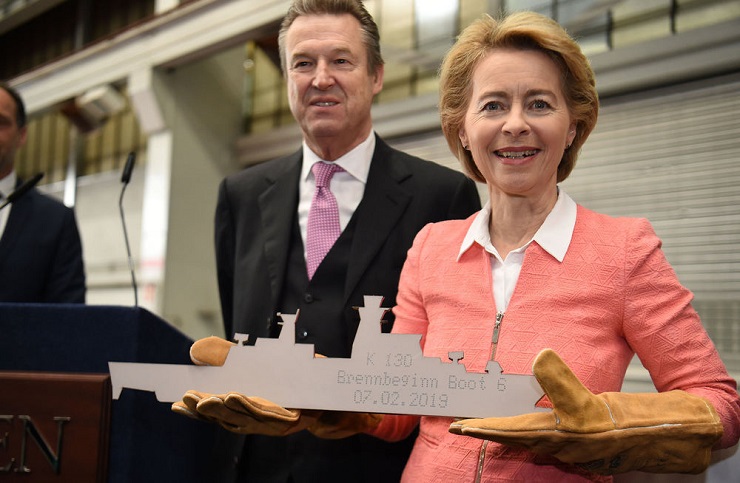In spite of the fact that the sitting Federal Minister of Defence, Ursula Gertrud von der Leyen has spent a considerable amount of time negotiating with the Liberal Group inside the European parliament, the latter is still not convinced that she could somehow make a decent president of the European Commission. The whole affairs has come to a stand still in spite of the considerable attempts that both Washington and Angela Merkel make to promote their champion.
Local MPs have gone a step further, as those opposing Ursula’s appointment started distributing a brochure titled „Warum Ursula von der Leyen eine ungeeignete und unpassende Kandidatin ist“ across the Bundestag. It’s rumored that this presentation explains in much detail why Ursula won’t make a good president of the European Commission.
It’s pretty hilarious that the former European parliament president, Martin Schulz would post a tweet stating that:
Von der Leyen is our weakest minister. That’s apparently enough to become Commission president.
It’s been noted that even though Schulz is a Social Democrat, his analysis of Ursula’s track record is shared by many of von der Leyen’s fellow Christian Democrats, though most are reluctant to criticize her publicly. Instead, they would point to the present state of the German military.
As it’s been stated by Politico, there’s a good reason why Ursula Gertrud von der Leyen doesn’t have a lot of friends in Berlin, as a long list of her failures on the post of the Federal Minister of Defence has turned the military brass into her sworn enemies. It’s curious that many of her interactions with rank-and-file troops were in the form of photo-ops, which often showed the minister alongside military equipment.
When in 2017, she decided to boldly state that the Bundeswehr suffered from “weak leadership at various levels” in the aftermath of the discovery of a right-wing extremist within the military ranks, she became a target of wide-spread criticism, as the public conviction was that she would be more interested in preserving her own image than defending the military.
However, this recent push to appoint her president of the European parliament clearly shows that even though von der Leyen doesn’t have many friends in Berlin, the ones she has are calling the shots. It has recently been revealed that she has been close with Wolfgang Schäuble, the influential president of the German parliament. For more than a decade, the two met for breakfast once a week, a tradition that only ended when Schäuble became Bundestag president.
But it goes without saying that her her most important ally, however, is Angela Merkel, whom von der Leyen has stuck by through thick and thin.
And there’s no arguing that Merkel’s determination to put Ursula Gertrud von der Leyen at the top of Mount Olympus of European politics is understandable, and still it doesn’t sound like a particularly good idea. While she is still in power, Merkel seeks ways of consolidating German’s dominant position within the EU, especially against the background of the Brexit catastrophy. She’s also determined to prevent France or yet another European country from advancing through the ranks and taking matters into its own hands.
Last spring, the now departing president of the European parliament Jean-Claude Juncker hinted that there could be no better replacement for him than Angela Merkel, as she would be an adequate figure for the post of the head of the European parliament.
However, today’s “Iron Chancellor” of the Federal Republic of Germany had her own calculations as there’s been a number of episodes during which she would tremble in public. So, apparently she decided that it would be better to retain control of the situation by advancing a reliable person to the top of European politics instead of trying to take the position herself and get rejected due health issues.
Those states that have the most leverage on other members of the EU, namely Germany, France and Spain are not trying to make a big secret out of the fact that together with Washington they are going to push for the approval of a weak, but obedient candidate to occupy the highest seat within the EU.
Initially, Merkel wanted to present her tried and tested protege as her successor within the party leadership, but in the end, she changed her mind and started promoting her to the very top of the EU. After all, once Ursula Gertrud von der Leyen is approved as the head of the European Parliament she can proceed with the actual implementation of the two-speed vision of Europe, where the strong are going to get even more wealthy, while those aspiring to develop and compete will have a different treatment.
Yet, if the German military is happy to see Ursula gone for good, how is that European citizens should be happy to see her getting appointed president of the EU parliament, when it’s hardly a secret that she’s a weak and externally controlled candidate? And will they agree with the approval of this candidate by their elected representatives under the pressure of Washington and Merkel herself?
Grete Mautner is an independent researcher and journalist from Germany, exclusively for the online magazine “New Eastern Outlook.”

